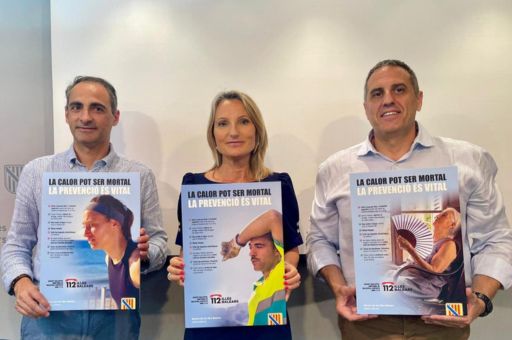The campaign, under the slogan “Heat Can Be Deadly, Prevention Is Vital”, is promoted by three ministries: the Presidency, Health, and Business.
The Government of the Balearic Islands continues to strengthen its prevention campaigns in emergency situations. Under the slogan “Heat Can Be Deadly, Prevention Is Vital”, a new public awareness campaign has been launched today aimed at the general population. Its objective is to share key prevention recommendations and reduce risks associated with high temperatures.
This is an innovative campaign, as in previous years, each ministry issued its guidelines. This year, the main tips have been unified—since most of them overlapped—to create a single, more effective campaign that can reach all residents and visitors in the Balearic Islands.
TDB keeps you informed. Follow us on: Facebook, Twitter and Instagram
The Balearic Government Launches New Awareness Campaign with Tips to Tackle Heatwaves and Prevent Emergencies
Specifically, the campaign is led by three ministries: the Ministry of Presidency and Public Administration, through the Directorate General for Emergencies and Interior; the Ministry of Health, via the Directorate General for Public Health; and the Ministry of Business, Employment and Energy, through IBASSAL. It was presented this morning by Pablo Gárriz (Director General for Emergencies and Interior), Amadeo Vázquez (Head of Public Health), and Catalina Cabrer (Regional Secretary for Labour, Employment and Social Dialogue).
The campaign’s key tips to avoid risk are:
- Avoid physical activity during peak sunlight hours (12:00 pm to 4:00 pm).
- Avoid sports activities during the hottest hours of the day (12:00 pm to 4:00 pm).
- Seek shade, cover your head, and wear light clothing.
- Drink plenty of water, even if you’re not thirsty.
- Eat light meals and use sunscreen—even if you’re not directly exposed to the sun.
- Keep blinds and windows closed during the hottest parts of the day.
“This may seem like a basic campaign, but it’s also extremely necessary,” said Public Health official Amadeo Vázquez. “Every summer, hospitals and health centres treat many patients for heatstroke, whether due to exercising at the wrong time, sun exposure without hydration at the beach, or serious burns from not using sunscreen.”
Last year, Public Health was notified of 23 suspected heatstroke cases, but only one was confirmed—an infant in Menorca during an orange alert for high temperatures. The 10-month-old was hospitalised at Mateu Orfila Hospital and later discharged. In 2023, 25 suspected cases were reported, of which only 3 were confirmed. Since the surveillance system began in 2004, there have been 145 suspected cases, with 54 confirmed and 10 resulting in death.
Although the campaign is aimed at the general public, it places special focus on vulnerable groups: the elderly, children, people with chronic illnesses, and outdoor workers.
“We are concerned about the safety of workers who perform outdoor jobs during the hottest months,” said Catalina Cabrer, Regional Secretary for Labour, Employment and Social Dialogue. “IBASSAL continues its outreach and awareness campaigns, which began last year, and conducts site visits to ensure businesses across the islands are complying with heat-risk prevention protocols. We started in March and have carried out nearly 400 visits.”
The campaign sends a clear message: heat is not just uncomfortable—it poses a real health risk. It’s vital to follow prevention advice and call 112 in any emergency.
“From 112 Emergencies, we try to build public awareness,” said Pablo Gárriz, Director General for Emergencies and Interior. “We issue warnings ahead of heatwaves and activate the Meteobal Plan and relevant alerts.” Last year, the Meteobal Plan was activated for 51 days across the Balearic Islands: 24 in Mallorca, 14 in Ibiza and Formentera, and 13 in Menorca.
As Gárriz summarised, “The best advice is to avoid putting yourself at risk so you don’t need to call emergency services. That’s why these prevention tips are so important.”
The campaign is already visible across the Balearic Islands. Posters featuring the key advice were placed in illuminated advertising displays (OPIs) starting in early June. It will also be promoted through radio, press, and digital media. Today, the official campaign video was presented and will be broadcast on TV and shared via the social media channels of the Government and its ministries.
The campaign will also appear on public transport buses. In Mallorca, it will run from July 1 to August 30 (with possible extension) across 18 buses. In Menorca and Formentera, the campaign will run until July 31 with participation from 10 buses.
The content will be disseminated in four languages—Catalan, Spanish, English, and German—to reach both local residents and international visitors.
Remember to follow these tips to enjoy a safe summer. And in any emergency, call 112.
